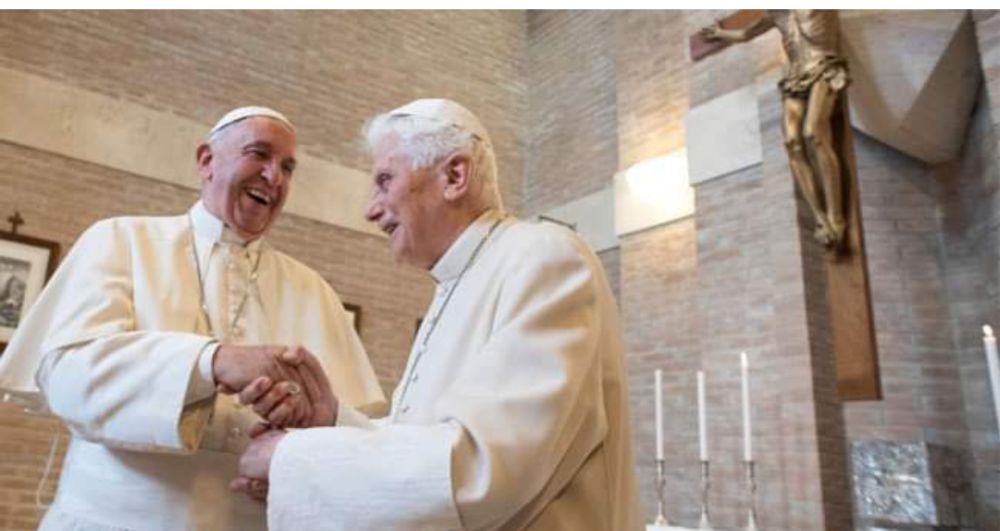Ex-Pope Benedict XVI appealed for forgiveness on Tuesday for clergy child séx abuse that occurred when he was archbishop of Munich, but aides dismissed claims of a cover-up.
“I can only express to all the victims of séxual abuse my profound shame, my deep sorrow and my heartfelt request for forgiveness,” the 94-year-old said in a letter published by the Vatican.
The letter from the former pontiff — who stepped down in 2013 — was released in response to a German inquiry last month that criticised his handling of cases involving paedophile priests in the 1980s.
“I have had great responsibilities in the Catholic Church. All the greater is my pain for the abuses and the errors that occurred in those different places during the time of my mandate,” he wrote.
Organizations representing victims of abuse, on the other hand, criticized him for not being more precise in his remarks.
Benedict upheld a Catholic Church history of claiming that “there were acts and mistakes, but no one assumes concrete responsibility,” according to the German organization Eckiger Tisch.
When he was archbishop of Munich between 1977 and 1982, a German investigation accused the former pope of intentionally failing to stop four priests accused of child séx abuse.
Benedict, who is feeble, enlisted the help of a team of assistants to respond to the long conclusions of law firm Westpfahl Spilker Wastl (WSW), which was tasked by the archdioceses of Munich and Freising to investigate abuse from 1945 to 2019.
In a statement released Tuesday, the aides asserted that “as an archbishop, Cardinal Ratzinger was not involved in any cover-up of acts of abuse,” referring to the pope by his birth name, Joseph Ratzinger.
Not Aware
In one example, a now-famous paedophile priest called Peter Hullermann was sent to Munich from Essen, where he had been accused of séxually abusing an 11-year-old kid.
When Benedict’s team disputed his attendance at a meeting about Hullermann in 1980, they admitted to sending the report authors inaccurate information unintentionally.
They denied that any decision regarding reassigning the priest to pastoral duties was made at that meeting, and maintained on Tuesday that the abuse had not been discussed.
“In none of the cases analysed by the expert report was Joseph Ratzinger aware of séxual abuse committed or suspicion of séxual abuse committed by priests. The expert report provides no evidence to the contrary,” the statement said.
In his letter, Benedict expressed hurt that the “oversight” over his attendance at the 1980 meeting “was used to cast doubt on my truthfulness, and even to label me a liar”.
Benedict, who lives in a former monastery within the Vatican walls, said he was grateful “for the confidence, support and prayer that Pope Francis personally expressed to me”.
Francis has said nothing in public although the Vatican defended Benedict last month, noting his meetings with abuse victims and introduction of laws to combat paedophilia.
Fear and Trembling
Before becoming pope, Benedict led the Vatican’s doctrinal congregation, giving him ultimate responsibility to investigate abuse cases.
In his letter, he spoke of “confession”, saying that every day, he asked himself whether he was guilty of “a most grievous fault”, using the phrase said during confession at Mass.
“In all my meetings… with victims of séxual abuse by priests, I have seen at first hand the effects of a most grievous fault,” he wrote.
“I have come to understand that we ourselves are drawn into this grievous fault whenever we neglect it or fail to confront it with the necessary decisiveness and responsibility, as too often happened and continues to happen.”
But his comments fell short of what the SNAP survivors network said was required.
“The opportunity for cleansing (that) the report out of Munich offered has been squandered,” it said, condemning Benedict’s “lack of candour”.
Benedict finished his letter observing that “quite soon, I shall find myself before the final judge of my life”.
“As I look back on my long life, I can have great reason for fear and trembling,” he wrote.
But he was nevertheless “of good cheer” as he prepared to “pass confidently through the dark door of death”.
